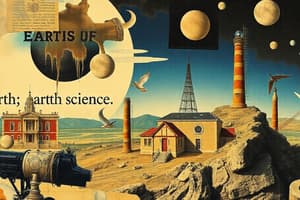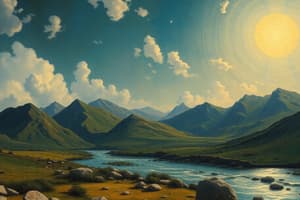Podcast
Questions and Answers
What is crystallization?
What is crystallization?
- As magma cools, different crystals form at different temperatures (correct)
- Cooling of water
- The process of eroding by wind
- Forming sediments
Erosion involves transporting sediments from one place to another.
Erosion involves transporting sediments from one place to another.
True (A)
What describes the texture of a material?
What describes the texture of a material?
The feel, appearance, or consistency of a surface or substance.
What are igneous rocks formed from?
What are igneous rocks formed from?
How are metamorphic rocks formed?
How are metamorphic rocks formed?
Metamorphism involves only changes in temperature.
Metamorphism involves only changes in temperature.
What is an outcrop?
What is an outcrop?
What is a road cut?
What is a road cut?
What is a precipitate?
What is a precipitate?
What describes the rock cycle?
What describes the rock cycle?
What are sediments?
What are sediments?
How are sedimentary rocks formed?
How are sedimentary rocks formed?
What is sedimentation?
What is sedimentation?
Weathering wears rocks down into larger pieces.
Weathering wears rocks down into larger pieces.
Where do sediments come from?
Where do sediments come from?
What occurs during the rock cycle?
What occurs during the rock cycle?
What is a rock?
What is a rock?
How are rocks classified?
How are rocks classified?
What is Quartzite?
What is Quartzite?
What determines how much time crystals have to form?
What determines how much time crystals have to form?
What happens to metamorphic rocks when exposed to extreme heat and pressure?
What happens to metamorphic rocks when exposed to extreme heat and pressure?
What changes can occur in sediments from erosion?
What changes can occur in sediments from erosion?
How can a metamorphic rock change into an igneous rock?
How can a metamorphic rock change into an igneous rock?
What is the process for a sedimentary rock to change into a metamorphic rock?
What is the process for a sedimentary rock to change into a metamorphic rock?
Flashcards are hidden until you start studying
Study Notes
Rock Formation and Types
- Crystallization occurs when magma cools, leading to different crystals forming at various temperatures.
- Igneous rocks result from cooling magma, transforming molten rock into solid forms.
- Sedimentary rocks are formed through the compaction and cementation of sediments like gravel, sand, silt, or clay.
- Metamorphic rocks arise when existing rocks change due to heat and pressure within the Earth.
- Three main rock types include igneous, sedimentary, and metamorphic.
Geological Processes
- Erosion transports sediments by wind, water, or other natural agents, contributing to rock formation.
- Weathering breaks down rocks at the Earth's surface into smaller pieces, creating sediments.
- Sedimentation refers to the laying down or depositing of sediments over time.
Rock Cycle
- The rock cycle describes how one type of rock transforms into another through various processes without a clear beginning or end.
- Each rock type can change into another type through erosion, melting, cooling, or pressure.
Key Definitions
- An outcrop is a rock formation exposed at the surface, visible in its natural location.
- Precipitate refers to an insoluble solid that emerges from a liquid solution.
- Texture describes the size, shape, and arrangement of mineral grains within a rock.
Rock Properties
- Rocks are classified by their mineral composition and texture, with each rock type having a distinctive set of minerals.
- Most rocks are composed of various minerals, while quartzite is exclusively made of quartz.
Historical Context
- James Hutton is known as the father of geology for recognizing that rocks show no definitive beginning or end.
- Changes in rocks can span millions of years, making them appear unchanging during human timelines.
Metamorphic Processes
- During metamorphism, rocks undergo changes in mineral composition and texture due to exposure to extreme heat and pressure without melting.
- Quartzite forms from quartz sandstone when subjected to heat and pressure in the Earth.
Transformations and Cycles
- Transformations between rock types include:
- Metamorphic rock to igneous rock through melting and cooling of magma.
- Metamorphic rock to sediments via weathering and erosion.
- Igneous rock to metamorphic rock through heat and pressure.
- Sedimentary rock to metamorphic rock via heat and pressure.
Sediment Formation
- Sediments are primarily formed from the weathering and erosion of pre-existing rocks.
Practical Applications
- Rocks can be studied in their natural outcrop locations for geological research.
- Understanding the rock cycle is crucial for comprehending Earth's geological history and processes.
Studying That Suits You
Use AI to generate personalized quizzes and flashcards to suit your learning preferences.




